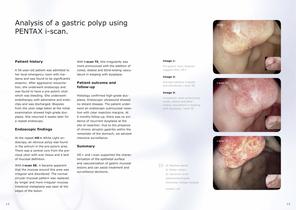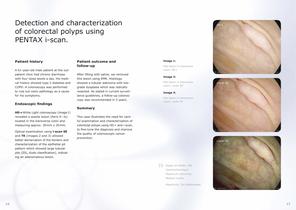
Catalog excerpts

i-scan Mini-Atlas Case studies from clinical practice with HD + and i-scan.
Open the catalog to page 1
Visible excellence. Gastrointestinal endoscopy with HD and i-scan. + Index Introduction3 HD and i-scan at a glance + 4 5 – PENTAX i-scan in characterization of Barrett’s oesophagus 6 7 – PENTAX i-scan in surveillance endoscopy in a patient with familial adenomatous polyposis 8 9 – PENTAX i-scan in diagnosis of gastric adenoma 10 11 – Gastric high-grade dysplasia of the antrum demonstrated with PENTAX i-scan 12 13 – Analysis of a gastric polyp using PENTAX i-scan 14 15 – Detection and characterization of colorectal polyps using PENTAX i-scan 16 – 17 Detection and...
Open the catalog to page 2
Your eyes are familiar with natural, sharp vision. Why give them anything less? Advantages of HD and i-scan at a glance. + HD in tubulo-villous adenoma + • Supports fast orientation and detection • Significant improvement in the visibility and evaluation of minute lesions • ntegrated zoom function for more detailed I inspection of suspicious surface structures Enrich your endoscopic options with HD and i-scan. + The i-scan technology is based on the post processing of reflected light. i-scan can be switched on and off by simply pushing a button on the endoscope. The different i-scan...
Open the catalog to page 3
PENTAX i-scan in characterization of Barrett’s oesophagus. Patient history A 67-year-old man with reflux symptoms was referred for an upper gastrointestinal endoscopy after no relief with proton pump inhibitors. At endoscopy, he was found to have a Barrett’s oesophagus C3M5, according to the Prague classification. Endoscopic findings With HD + White Light endoscopy, we identified an area of mucosa that appeared slightly featureless on initial examination. With the addition of i-scan SE, this area became more evident. Normal glandular mucosa surrounded a central area where the mucosal...
Open the catalog to page 4
PENTAX i-scan in surveillance e ndoscopy in a patient with familial adenomatous polyposis. Patient history A 42-year-old woman with familial adenomatous polyposis (FAP) syndrome presented for esophagogastroduodenoscopy. She underwent her first colonoscopy five years ago, because both her father and uncle died of colorectal cancer at the ages of 45 and 50, respectively. Her first colonoscopy revealed more than 100 small polyps throughout the colon which were all tubular adenomas. DNA analysis showed a mutation of the APC gene confirming the diagnosis of FAP. A protective total colectomy...
Open the catalog to page 5
PENTAX i-scan in diagnosis of gastric adenoma. Patient history A 55-year-old female patient was referred to our GI unit for endoscopic submucosal dissection of a lesion at the gastric angular fold. Biopsies taken at the referring hospital revealed an adenoma with high-grade intraepithelial neoplasia (HGIN). Endoscopic findings The upper gastrointestinal endoscopy showed a flat-depressed lesion (IIa c – according to the Paris classification) at the angular fold measuring approximately 42 mm x 37 mm in diameter. HD + White Light imaging clearly shows the lesion. By adding i-scan SE, the...
Open the catalog to page 6
Gastric high-grade dysplasia of the antrum demonstrated with PENTAX i-scan. Patient history This 62-year-old male patient was brought in with a long history of intermittent upper abdominal pain and a known gastric ulcer of at least 30 years. He was found to have an incidental positive faecal occult blood test and underwent colonoscopy and upper gastrointestinal endoscopy. There was no history of melaena or vomiting. Apart from hypertension, for which he was taking anti-hypertensives, he was well. Endoscopic findings The oesophagus and duodenum were normal. The stomach distended easily and...
Open the catalog to page 7
Analysis of a gastric polyp using PENTAX i-scan. Patient history A 56-year-old patient was admitted to her local emergency room with malaena and was found to be significantly anaemic. After aggressive resuscita tion, she underwent endoscopy and was found to have a pre-pyloric ulcer which was bleeding. She underwent endotherapy with adrenaline and endoclips and was discharged. Biopsies from the ulcer edge taken at the initial examination showed high-grade dysplasia. She returned 4 weeks later for a repeat endoscopy. Endoscopic findings At the repeat HD + White Light endoscopy, an obvious...
Open the catalog to page 8
Detection and characterization of colorectal polyps using PENTAX i-scan. Patient history A 61-year-old male patient at the outpatient clinic had chronic diarrhoea with four loose stools a day. His medical history showed type 2 diabetes and COPD. A colonoscopy was performed to rule out colon pathology as a cause for his symptoms. Endoscopic findings HD + White Light colonoscopy (image 1) revealed a sessile lesion (Paris 0 Is) – located in the transverse colon and measuring approx. 30 mm x 20 mm. Optical examination using i-scan SE and TE (images 2 and 3) allowed better demarcation of...
Open the catalog to page 9
Detection and characterization of dysplasia in ulcerative colitis using PENTAX i-scan. Patient history A 79-year-old man with long-standing ulcerative colitis, currently in remission, was referred to our endoscopy unit for surveillance colonoscopy. Endoscopic findings The rectum and left colon showed a relatively normal pit pattern and some pseudopolyps, indicating chronic inflammation. Using HD + White Light image, a 60 mm large circumscribed lesion with irregular margins (0 IIa LST of non-granular – type) was found in the right colon. i-scan SE and TE helped to demarcate the borders...
Open the catalog to page 10
Analysis of colorectal cancer using PENTAX i-scan. Patient history A 72-year-old man was referred to our emergency department because of dizziness and discomfort. On physical examination, the skin appeared pale. Laboratory investigation showed anaemia with haemoglobin of 7.8 g/dl (reference 13 17), serum iron of 35 µg/dl – (40 160) and C-reactive protein of – 90 mg/l (< 5). Faecal occult blood testing was positive. EGD was normal. Endoscopic findings HD + White Light colonoscopy (image 1) revealed a large neoplasia in the ascending colon with a central depression. Analysis of the...
Open the catalog to page 11Archived catalogs
-
HD+ Bronchoscope EB-1990i
2 Pages
-
NaviAid AB
2 Pages
-
The i10 endoscope series
2 Pages
-
PENTAX Medical Brochure
5 Pages
-
EC-3490Ti
2 Pages
-
90i and 90K
2 Pages
-
Speech, Voice & Swallowing
8 Pages
-
CLASSIC-CART
2 Pages
-
Digital Video Processor
2 Pages
-
Intubation
2 Pages
-
video endoscopy for ENT
2 Pages
-
Video Bronchoscopes
2 Pages
-
Monochrome Bronchoscopes
2 Pages
-
EB-1575K
4 Pages
-
SAFE-3000
4 Pages
-
90i-90k
2 Pages
-
ENT Video Scope
2 Pages
-
Fiber Gastroscopes
2 Pages
-
Monochrome Gastroscopes
2 Pages
-
Video Gastroscopes
2 Pages
-
NaviAid™ BGE
4 Pages
-
More than meets the eye
16 Pages
-
Confocal Endomicroscopy
2 Pages
-
EPK-i and EPK-i5000
6 Pages
-
HD+ and i-scan
8 Pages




























